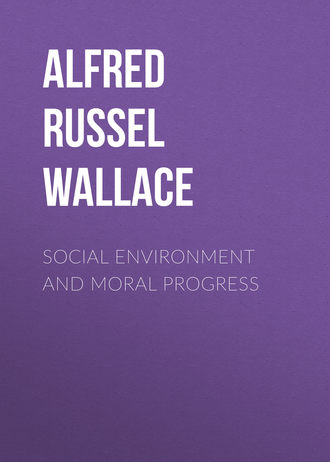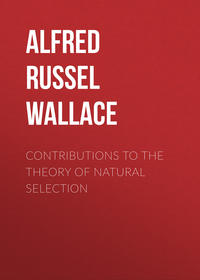 полная версия
полная версияSocial Environment and Moral Progress
I have given a rather full account of what the Pyramid builders really did, because it forms a very important part of the argument I am developing as to the stationary condition of the human intellect during the historical period.
The great majority of educated persons hold the opinion that our wonderful discoveries and inventions in every department of art and science prove that we are really more intellectual and wiser than the men of past ages—that our mental faculties have increased in power. But this idea is totally unfounded. We are the inheritors of the accumulated knowledge of all the ages; and it is quite possible and even probable, that the earliest steps taken in the accumulation of this vast mental treasury required even more thought and a higher intellectual power than any of those taken in our own era.
We can perhaps best understand this by supposing any one of our great men of science to have been born and educated in one of the earliest of the civilisations. If Newton had been born in Egypt in the era of the Pyramid builders, when there were no such sciences as mathematics, perhaps even no decimal notation which makes arithmetic so easy to us, he could probably have done nothing more than they have actually done. In building up the sciences each of the early steps was the work of a genius. But now that there has been nearly a hundred centuries of discovery and specialisation by thousands or even millions of workers, that by means of writing and of the printing press every discovery is quickly made known, and that ever larger and larger numbers devote their lives to study, the rate of progress becomes quicker and quicker, till the total result is amazingly great. But that does not prove any superiority of the later over the earlier discoveries. There is, therefore, no proof of continuously increasing intellectual power.
But we have now evidence of another kind, which adds to the force of this argument.
Quite recently, papyri have been discovered which give us information as to the ideas, the beliefs, and the aspirations of a period even earlier than that of the Great Pyramid. The result of the study of these and other records of early Egypt is thus stated by Professor Adolf Erman in The Historian's History of the World:
"But when one considers the ancient resident of the valley of the Nile as a human being, with desires, emotions, and aspirations almost precisely like our own; a man struggling to solve the same problems of practical Socialism that we are struggling for to-day—then, and then only, can the lessons of ancient Egyptian history be brought home to us in their true meaning, and with their true significance. And clearest of all will that significance be, perhaps, if we constantly bear in mind the possibility that the whole sweep of Egyptian history, during the three or four thousand years that separated the Pyramid builders from the contemporaries of Alexander, was a time of national decay—a dark age, if you will—in Egyptian history."
That a great historian, from a study of the ideas and social aspirations of the earliest known civilisations, should have arrived at similar views as to the identity of their mental capacity with our own as I have deduced from their scientific attainments, must be held to be a very strong argument in support of the accuracy of our independent conclusions.
CHAPTER V
SPEECH AND WRITING AS PROOFS OF INTELLIGENCE
There is yet another proof that the faculties of mankind at a very early epoch were fully equal to those of our own time. There is perhaps nothing more difficult in its nature, more utterly beyond the mere lower animal, than the faculty of articulate speech possessed by every race of mankind. We cannot but believe that its acquisition was an extremely slow process, and that it is rendered possible by special cerebral developments giving the necessary mental power for its acquirement.
How long a process this would be, it is impossible to say, but it would certainly have had to reach a high degree of perfection before the equally difficult process of inventing a mode of writing could have been brought to such perfection as to facilitate the further development of the higher faculties through poetry on the one hand and the preservation of facts and discoveries, as well as trains of reasoning, on the other.
Now, I wish to call attention to the very important fact that the origin and development of speech, and later, of writing, were apparently almost simultaneous, and certainly quite independent of each other, in countries not very distant apart. This is shown by the radical diversity of the different groups of languages in Europe, Eastern Asia and North Africa, and the equal diversity of Egyptian, Assyrian, and Chinese writing. All other written characters are believed to be derived from one or other of these, and it is known that the forms and peculiarities of alphabetic characters have been greatly modified by the various materials employed, such as wood and stone slabs, clay, or wax; papyrus, paper or parchment; and whether engraved, impressed or painted, whether written with a reed or quill pen, or with a small brush.
But if intellectual man as a species of mammal had developed by the preservation of variations of survival-value, we should expect to find such an important faculty as speech to have originated in one centre and to have spread rapidly over the world with only slight modifications in isolated communities. The fundamental diversities we find seem to accord better with the conception that when, as a mere animal, his material organism had reached the required degree of perfection, there occurred the spiritual influx which alone enabled him to begin that course of intellectual and moral development, and that marvellous power over the forces of Nature, in which speech and writing, followed by printing, have been such important factors.
In order for man to develop speech he must have possessed a brain and an intellect far above that of the brutes. As in the more fundamental problem of the origin of life, it is admitted that organisation is a product of life—not life of organisation—so we must believe that speech was a product of a brain and an intellect sufficient for their development. But such brain and intellect were not necessary for the lower animals, which have reached their highest lines of development in the dog, horse, elephant, and ape without making any definite approach to the acquirement of such higher faculties.
CHAPTER VI
SAVAGES NOT MORALLY INFERIOR TO CIVILISED RACES
If the facts and arguments set forth in the preceding chapters are correct we should not expect to find any living examples of the unspiritualised man, since the assumption is that the whole race received the influx which started them on their course of purely human development within a strictly limited period, perhaps of a very few generations or even one generation. The ancestral form—the supposed missing link—would then have become extinct.
If this were not so we should expect to find some isolated groups of speechless man, and of this there is no example; but, on the contrary, the very lowest of existing races are found to possess languages which are often of extreme complexity in grammatical structure and in no way suggestive of the primitive man-animal of which they are supposed to be surviving relics. So long as we got our knowledge respecting them from the low-class Europeans who captured them for slaves or shot them down as wild beasts, we could not possibly acquire any real knowledge of them as human beings. But now that we have more trustworthy accounts of them by intelligent travellers or missionaries, we find ample evidence that when by kindness and sympathy we penetrate to their inner nature, we discover that they possess human qualities of the same kind as our own. A few examples of what unprejudiced witnesses say of them will be very instructive.
Darwin, after attending a meeting between Captain Fitzroy and the chief of a small island near Tahiti to settle a question of compensation for injury to an English ship, says: "I cannot sufficiently express our surprise at the extreme good sense, the reasoning powers, moderation, candour, and prompt resolution which were displayed on all sides."
Captain Cook himself, who saw them in their primitive condition, speaks of the natives of the Friendly Isles as being "liberal, brave, open and candid, without either suspicion or treachery, cruelty, or revenge"; and a century later Admiral Erskine remarks that "they carry their habits of cleanliness and decency to a higher point than the most civilised nations"; while all the Polynesian races are kind and attentive to the sick and aged, and unlimited hospitality is everywhere practised by them.
Even the Australian aborigines, who are often said to be one of the lowest of human races, are found to possess many good qualities by those who know them best. Mr. Curr, who was for forty years protector of the aborigines in Victoria, says:
"Socially, the black is polite, gay, fond of laughter, and has much bonhomie in his composition. . . . The natives are very strict in obeying their laws and customs, even under great temptation. The horror of marrying a woman within the prohibited degrees of relationship, the extreme grief they manifest at the death of children or relatives, and sometimes even for white men, as illustrated by the native boy who was the sole companion of the unfortunate Kennedy when he was murdered, are sufficient to indicate that they possess affections and a sense of right and wrong not very different from our own."
The fact that the physical characteristics of the Australians are substantially those of the Caucasian race in its lowest types has led me to conclude that these interesting people may have been descended from much more civilised remote ancestors, and are thus an example of degradation rather than of survival.2
Many other illustrations of both intelligence and morality are met with among savage races in all parts of the world; and these, taken as a whole, show a substantial identity of human character, both moral and emotional, with no marked superiority in any race or country. In intellect, where the greatest advance is supposed to have occurred, this may be wholly due to the cumulative effect of successive acquisitions of knowledge handed down from age to age. Euclid and Archimedes were probably the equals of any of our greatest mathematicians of to-day, while the architecture of Greece, of India, and of Central America is little inferior to mediæval Gothic. But none of these, though so different in style, can be said to prove any real advance in intellectual power from that of the builders of the much more ancient temples and pyramids of Egypt. This latter country, too, in its high material civilisation and its remarkable religious system, shows itself the equal of any that has succeeded it.
CHAPTER VII
A SELECTIVE AGENCY NEEDED TO IMPROVE CHARACTER
The general result of the facts and arguments now set forth in the merest outline leads us to conclude that there has been no definite advance of morality from age to age, and that even the lowest races, at each period, possessed the same intellectual and moral nature as the higher. The manifestations of this essentially human nature in habits and conduct were often very diverse, in accordance with diversities of the social and moral environment. This is quite in accordance with the now well-established doctrine that the essential character of man, intellectual, emotional, and moral, is inherent in him from birth; that it is subject to great variation from individual to individual; and that its manifestations in conduct can be modified in a very high degree by the influence of public opinion and systematic teaching. These latter changes, however, are not hereditary, and it follows that no definite advance in morals can occur in any race unless there is some selective or segregative agency at work.
As there is a great amount of misconception on this subject some explanation may be advisable. Many well-educated and intelligent persons seem to think that whatever characters or faculties are hereditary are also necessarily cumulative. They hear that mental as well as physical characteristics are hereditary; their own observation tells them that there are musical families as well as tall families. They hear that the late Sir Francis Galton wrote a book on Hereditary Genius, and perhaps they have read it; but they do not observe that neither he nor anyone else has proved that genius of any kind is cumulative, that is that a man or woman of genius will have, on the average, some one or more children with a greater amount of that special power or faculty than their own. The very contrary of this is really the case. The more a person's talent or mental power is above the average the less chance there is that any of his or her children will have still more of that power than he has. A really great poet, or painter, or musician, appears suddenly in a family of mediocre ability or of no ability at all in that special direction. A few examples may be instructive.
Sir William Herschell was the son of a German musician, and was himself a musician by profession; but he became an astronomical genius, one of the greatest of his age. His son, Sir John Herschell, was a very clever man, with advantages of education and position. He followed his father as an astronomer, and was a great mathematician, but is never considered to be equal to his father. Darwin's most eminent son was a mathematician, not a naturalist.
The reason of this is that heredity follows the law of "recession to mediocrity." This is, that all groups of living things vary around an average or mean as regards each of their characters; and those near the average are always numerous, while as we approach the extremes in either direction the numbers become less and less. Families follow the same law. If you take a family for three or four generations, including perhaps some hundreds of persons, some will be short, some tall; but the majority will be near the mean, and the tallest of all will be less likely to have taller descendants than themselves than those nearer the average. But the children of the tallest, though generally shorter than their parents, will still tend to be above the average height.
When a character is so useful to its possessor in the struggle for existence as to be of what is termed "survival value," then those that vary most above the average will be preserved or selected generation after generation as long as the increase is useful.
It is because the higher intellectual or moral powers are so rarely of life-preserving value, and are not unfrequently the reverse, that they are not cumulative, though they are hereditary.
With this explanation we will now proceed to examine somewhat closely our moral position as a nation; what is the nature of our social environment; how it came to be what it is, and what lessons we may learn from it.
CHAPTER VIII
ENVIRONMENT DURING THE NINETEENTH CENTURY
During the eighteenth century our material civilisation, which had long been almost stationary, began to advance with the growth of the physical sciences, but at first with extreme slowness. The earliest steps were made by the application of machinery to some of the domestic arts. Some refinements were made in the manners and customs of our daily life; but there were few, if any, indications of permanent or widespread change, either for better or worse, in our intellectual or moral nature.
The nineteenth century, however, saw the initiation of a great change in the economic environment due to the rapid invention of labour-saving machinery; which, with the equally rapid application of steam power, led to an increase of wealth production such as had never been known on the earth before. During the same period new modes of locomotion were brought into daily use, the facilities for inter-communication were increased a hundred-fold, scientific discoveries opened up to us new and unthought-of mysteries of the universe, and the whole earth was ransacked for its treasures, both vegetable and mineral, to an extent that surpassed all that had been accomplished since the dawn of civilisation.
But this rapid growth of wealth, and increase of our power over Nature, put too great a strain upon our crude civilisation and our superficial Christianity, and it was accompanied by various forms of social immorality, almost as amazing and unprecedented. Some of these may be here briefly referred to.
Our vast textile factory system may be said to have commenced with the nineteenth century, and the profits were at first so large and so dependent on the supply of labour that the mill-owners hired children from the workhouses of the great cities by hundreds and even thousands. These children, from the age of five or six upwards, were taken as apprentices for seven years, and they really became the slaves of the manufacturers, whose managers made them work from 6 a.m. to 7 p.m., or sometimes longer; and, in order to keep them awake in the close atmosphere of the factories it was found necessary to whip them at frequent intervals. It was not till 1819 that the age of children employed in factories was raised to nine years, while in 1825 the working hours were limited to seventy-two a week!
From that time onward, during the whole of the nineteenth century, there was a continued succession of "Factory Acts," each aiming at abolishing or ameliorating the worst results of child labour—its inhumanity, its cruelty, and its immorality. These legislative efforts were always opposed by the employers, who usually succeeded in so mutilating them in Committee of the House of Commons as to render them almost useless. Mrs. E. B. Browning's noble verses, The Cry of the Children, show that after nearly fifty years of struggle the condition of the child-workers was still, in a high degree, cruel, degrading, and therefore immoral; while that of the half-timers who succeeded them was almost as injurious.
As the century wore on, other evils of a similar nature were gradually brought to light. Children and women were found to be working underground in coal mines, under equally vile conditions as regards health and morality; and an enormous loss of life was caused by inadequate ventilation, insecure roof-propping, imperfect winding machinery, and other causes, all due to want of proper precautions by the owners of the mines. As a matter of simple justice, such owners should be held responsible to the injured person not only to the full extent of his wages and for medical attendance, but should also pay a liberal compensation for the pain suffered, and for the extra labour, expense and anxiety to his family. But all such things are ignored in the case of poor workers, so that even the money compensation is reduced to the smallest amount possible.
It is one of the great defects of our law that deaths due to preventable causes in any profit-making business are not criminal offences. Till they are made so, it will be impossible to save the hundreds, or even thousands, of lives now lost owing to neglect of proper precautions in all kinds of dangerous or unhealthy trades. However costly such precautions may be, expense should not be considered when human life is risked; and the present state of the law is therefore immoral.
Notwithstanding Acts of Parliament and numerous Inspectors (whose salaries should be paid by the mine owners), explosions and other accidents underground continue to increase, the year 1910 being a record year, with its 1,775 deaths; and even the number in proportion to the workers employed is the highest for the last twenty years.
Yet no one is punished, or even held responsible for these deaths. Surely, this shows a deplorable absence of moral feeling, both in the general public and in Parliament. The responsibility of Parliament is really criminal, since it always allows its legislation to be made ineffective by the fear of diminishing the employers' profits, thus deliberately placing money-making above human life and human well-being.
In the case of mines and quarries, Parliament is especially responsible, because the possession of the mineral wealth of our country by private individuals is itself a gross usurpation of public rights, and should have been long ago declared illegal. Whatever arguments—and they are very strong—show us that the land itself should not be private property, are ten times stronger in the case of the minerals within its bowels. The value of land increases with its proper use, but in the case of minerals, the value is absolutely destroyed. Surely, it is a crime against posterity to allow the strictly limited mineral wealth of our country to be made private property, and very largely sold to foreigners, solely to increase the wealth of individuals and to the absolute impoverishment of ourselves and our children.3
I will here add one other argument which goes to the root of the matter by showing that the alleged owners of minerals have not even a legal title to them. It is, I believe, a maxim of law that public rights cannot be lost by disuse. Landed estates were, in our country, created by the Norman Conqueror to be held subject to the performance of feudal duties. Deep-seated minerals were then not known to exist, and were not (I believe) specifically included in the original grants. Except, therefore, where they have since been made private property by Act of Parliament, they still remain public property. I submit, therefore, that they may be both legally and equitably resumed by the Government as public property, and worked for the good of the public and of posterity. Compensation to the supposed present owners would be a matter of favour, not of right.
CHAPTER IX
INSANITARY DWELLINGS AND LIFE-DESTROYING TRADES
The enormous difference between town and country dwellers as regards duration of life and the prevalence of zymotic diseases has been known statistically since the era of registration, and a body of Health Officers have been set up to report upon the worst cases. The local authorities have power to compel the owners of unhealthy dwellings to put them into a sanitary condition, or even order them to be entirely rebuilt. But as many of the members of Corporations and other Local Boards are often themselves owners of such property, or have intimate friends who are so, very little has been done to remedy the evil. Again and again, in all parts of the country, the Health Officers have duly reported, but their reports have been ignored. In some cases where the Health Officer has been too persistent, he has been asked to resign or has been discharged. A few general facts may be here given.
By the last complete Census returns (1901), there are in England and Wales 7,036,868 tenements, and of these 3,286,526, or nearly half, have from one to four rooms only. In London, out of a total of 1,019,646 tenements, 672,030, or considerably more than half, have from one to four rooms; while there are about 150,000 tenements of only one room, in which are living 313,298 persons, or about two and a quarter persons in each room on the average. There are, however, about 20,000 persons living five in a room, and 20,000 more who have six, seven, or eight in a room. As most of these one-roomed tenements are either the cellars or attics of houses in the most crowded parts of large towns, where there is impure air, little light, and scanty water supply, the condition of those who dwell in them may be imagined—or rather cannot be imagined, except by those who have explored them.
Equally inhuman, immoral, and even criminal, is the neglect of all adequate measures to check the loss of infant life through the overwork, poverty, or starvation of the mother, together with overcrowded and insanitary dwellings. In the mad race for wealth by capitalists and employers most of our towns and cities have been allowed to develop into veritable death-traps for the poor. This has been known for the greater part of a century, yet nothing really effective has been done, notwithstanding abundant health legislation—again made useless by the dread of diminishing the excessive profits of manufacturers and slum-owners. One of the Labour newspapers calls our attention to the following facts for 1911 as to Infant mortality per 1,000 born:









